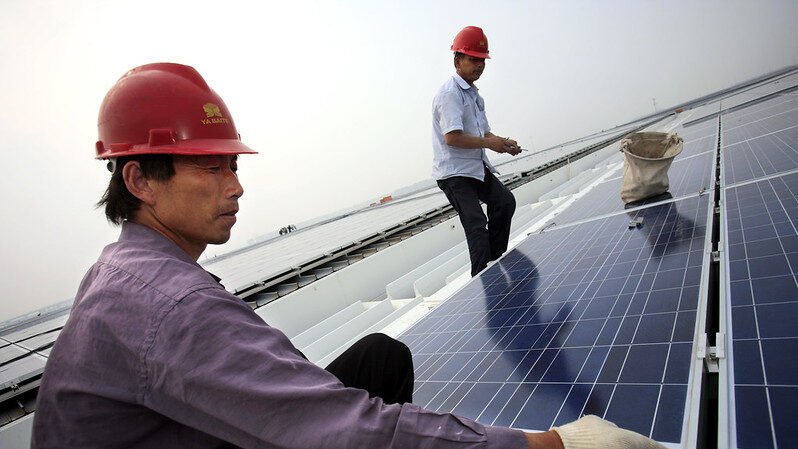Three months ago in Delhi, leaders of G20 major economies backed a tripling of global renewable energy capacity by 2030.
Then last Saturday in Dubai, a much bigger group of nations signed a similar pledge. Over 120 countries gave the document their signature but G20 nations like China, India and Indonesia were not among them.
That’s despite China dominating the renewables supply chain and the International Energy Agency forecasting that both China and India are already going to double their renewables by 2027, putting them on course to triple capacity by 2030 without any extra effort. So why the reluctance?
Well, the Cop28 pledge came in a package with anti-coal language and a more challenging target to double energy efficiency, with no quantified finance target to match. Experts told Climate Home major emerging economies were concerned about costs and reluctant to make commitments outside the formal UN climate process.
Coal and costs
Unlike the G20 agreement, the Cop28 pledge calls on signatories to “end the continued investment in unabated new coal-fired power plants, which is incompatible with efforts to limit warming to 1.5°C”.
Between them, the four G20 nations that didn’t sign the Cop28 pledge are building over four-fifths of the world’s new unabated coal-fired power plants, according to Global Energy Monitor.
“That could be why large emerging economies are concerned about the renewable energy declaration because it is tied to coal-based power generation,” said Centre for Science and Environment researcher Avantika Goswami.
What is Alterra, the UAE’s $30 billion green investment fund?
While the pledge does not require any individual country to triple their own renewable capacity, a source familiar with the Indonesian government’s position said it feared it will pressure them to do so.
For Indonesia, this could require early closure of coal-fired power plants and investment in grid stability in the Java-Bali area. “Both implies increasing financial burden to [state-owned energy company] PLN and to the government,” they said. “The reason that this pledge doesn’t come with financial and technical support has made Indonesia reluctant to support.”
The Asia Society’s climate lead Li Shuo told Climate Home that China would struggle to meet the target to double energy efficiency by 2030, which was not in the G20 agreement or in the US-China Sunnylands agreement.
Energy efficiency is calculated by dividing the size of an economy by its energy consumption and China’s economic growth has slowed down in recent years, making the target harder to reach.
Negotiating position
Li said that China “has not been a fan of side deals and declarations at the [UN climate talks]. They often feel these deals deviate from the [UN climate convention] and Paris Agreement and may be held against them in the future”.
Joyce Lee, policy director at the Global Wind Energy Council said that, as the pledge was launched at the start of the Cop28 climate talks “there’s a lot of public posturing”.
“In a negotiation dynamic, you don’t put yourself too close to where your ultimate position might be at the outset,” she said.
She added that in these countries “there’s a feeling that they’re doing a lot already on [reducing emissions]” and “may even be doing more than their fair share” given that they’ve contributed less to historic emissions than wealthy nations.
